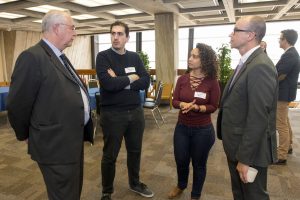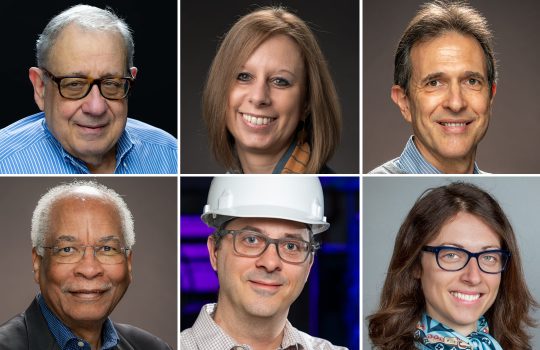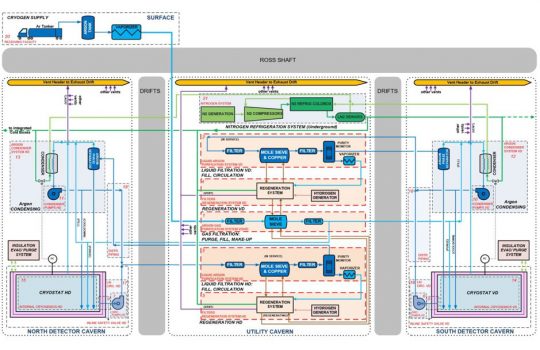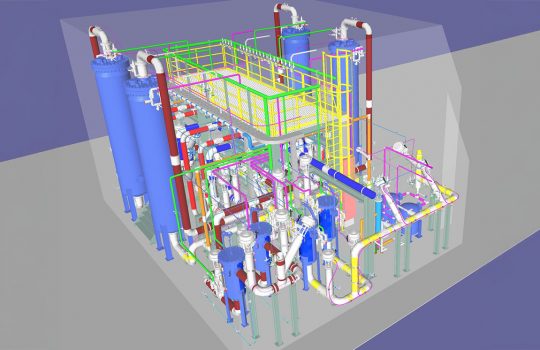
From left: Brazilian Center for Research in Physics Director Ron Shellard, Fermilab user Mateus Carneiro of Oregon State University, Fermilab user Mônica Nunes of the University of Campinas in Brazil and FAPESP Advisor Roberto Marcondes Cesar chat at a recent LBNF/DUNE Resources Review Board meeting. Photo: Reidar Hahn
A longstanding partnership between the Brazilian scientific community and Fermilab is getting even stronger, thanks in part to programs funded by the São Paulo Research Foundation. The foundation, whose Portuguese acronym is FAPESP, provides funding to experts from universities and companies in the state of São Paulo to engage in a broad spectrum of research both at home and abroad, from the study of Shakespeare to the simulation of particles in neutrino detectors.
“We’ve been funding many initiatives regarding international collaboration, such as telescopes in Chile, the CMS and ALICE experiments at the LHC, and researchers at Fermilab,” said Advisor Roberto Marcondes Cesar, whose portfolio at FAPESP includes particle physics research projects such as the Fermilab-hosted Deep Underground Neutrino Experiment. “FAPESP is funding some important projects in São Paulo that are related to DUNE. This is nice because it’s an area that attracts a lot of the attention of young people. And part of our mission is to attract young people to the different fields of research in São Paulo.”
Professors, postdoctoral researchers and students funded by FAPESP are currently engaged in a range of activities connected to Fermilab neutrino experiments. Theoretical physicists collaborate with Fermilab, Northwestern University and other institutions to refine predictions and develop more accurate interpretations of experimental data. Scientists and students work on neutrino experiments including DUNE, NOvA and the R&D project LArIAT.
“Neutrinos will probably be part of the most important discoveries in physics for the next 10 or 20 years,” Cesar said. “We are speaking about the most basic and important questions regarding matter and the universe.”
One of the largest efforts by São Paulo researchers on DUNE is the light-detection system known as ARAPUCA. This innovative device, developed by three Brazilian universities and Fermilab and named for the Guaraní word for bird trap, will collect very low light signals coming from the DUNE detectors. This will help scientists get more information out of the massive detectors being built to record the interactions of neutrinos.
“FAPESP support is a key element to insert Brazil in a proactive way into DUNE,” said Ernesto Kemp, professor at the University of Campinas. “Most of our work has always been in data analysis, and we have gradually begun to provide parts and calibration systems for detectors. But now we are starting to take on more important responsibilities to build whole systems for the big detectors like DUNE. FAPESP is an important funding agency because it is providing long-term support.”
Kemp and his students have been the recipient of several FAPESP grants and scholarships, including one that enabled him to spend a 2017 year-long sabbatical at Fermilab working on R&D for ARAPUCA. During his sabbatical he conducted experiments in Fermilab facilities and coordinated the construction of two ARAPUCA models for the ProtoDUNE detectors about to begin operating at CERN.
One of Kemp’s colleagues at the University of Campinas, Ettore Segreto, is funded by the FAPESP Young Investigators program for his work on DUNE. The Young Investigators program is designed to attract early-career scientists from around the world to São Paulo institutions.
“Talent is rare, and we have to compete to bring the best researchers to São Paulo,” Cesar said. “We want to bring people from abroad to do research here. We also want our researchers to make connections abroad to that they can cooperate, exchange students and participate in international collaborations.”
The Young Investigators program provides research funding to highly qualified early-career researchers who intend to create new research groups in emerging institutions or new research areas in traditional institutions. The program has been in place since the 1980s and accepts applications year-round for research in many areas, including particle physics in collaboration with Fermilab.
For more on the relationship between FAPESP and DUNE view this video interview with Roberto Marcondes Cesar.
For more on the current state and history of Brazilian scientific collaboration with Fermilab, read the articles “Mobilizing Brazilian scientists for DUNE” and “Brazil in Batavia: How a timely invitation sparked 30 years of partnership.”




